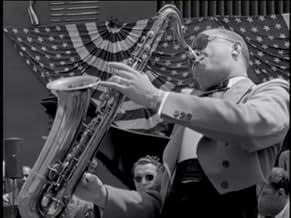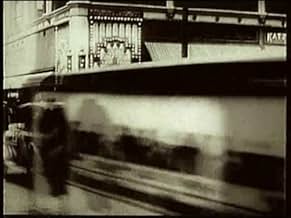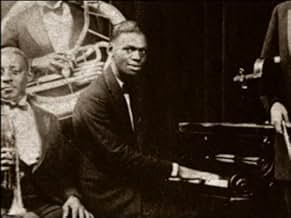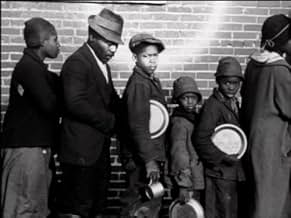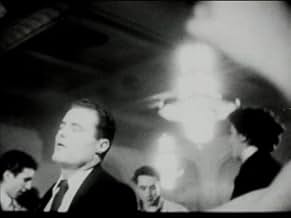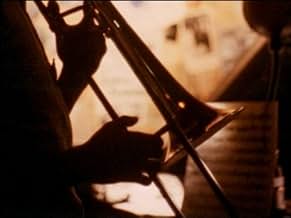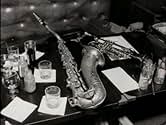Jazz: A Film by Ken Burns
- Minissérie de televisão
- 2001
- 1 h 48 min
AVALIAÇÃO DA IMDb
8,6/10
2,6 mil
SUA AVALIAÇÃO
Adicionar um enredo no seu idiomaA survey of the musical form's history and major talents.A survey of the musical form's history and major talents.A survey of the musical form's history and major talents.
- Indicado para 5 Primetime Emmys
- 2 vitórias e 7 indicações no total
Explorar episódios
Avaliações em destaque
I am neither a musician nor a serious scholar of jazz, just a fan,but even I could see the flaws in Ken Burns' sometimes fascinating, other times infuriating documentary on the history of "America's music".
Spanning the century, this nineteen hour documentary is most effective at the beginning, when Burns' gift for research is most apparent. You can see the pains he took searching documentation and rare photographs to paint a picture of the roots of the music. However, as the narrative moves on, his over-reliance for third and fourth hand accounts and his own ignorance of the genre becomes apparent.
I am not going to go into the laundry list of "should have" musicians (Lionel Hampton, Stan Getz, JJ Johnson, Charles Mingus gets only ten minutes!) and others that got short shrift or weren't even mentioned. I'd be here all day.
However, I will say that Burns obviously relied too much on critics and writers in putting together his material. Towards the end, especially when they begin to talk of the 50's and 60's, the whole program begins to have the taint of academia all over it.
For example, the 50s phenomenon of the wildly popular California-based "cool jazz" is dismissed by critic Nat Hentoff as "bland" and then never mentioned again.
I am sorry to disagree with the distinguished Mr. Hentoff, but as anyone who has heard the recordings of such greats as Gerry Mulligan and Chet Baker can atest, the music they were producing was just as creative and exciting as their East Coast, black contemporaries.
To people like Mr. Hentoff, the west coast musicians committed the ultimate sin of being white and somewhat popular. Much of the documentary continues along the same "us vs. them" vein.
It seems the people who assisted Mr. Burns took advantage of his ignorance and stamped their orthodox biases on what could have been a great work. Whole genres and types (fusion, Cubano, Brazillian) are either dismissed outright or ignored. It reinforces my view that critics are the most useless species on the face of the planet.
However, I do have to admit that many parts were fascinating. When Burns does interview eyewitnesses to certain events, it shows the flashes of "what might have been". I just wish that he wouldn't have blindly followed the opinions of the the critics and academics and let the audience discover for themselves what to think.
Spanning the century, this nineteen hour documentary is most effective at the beginning, when Burns' gift for research is most apparent. You can see the pains he took searching documentation and rare photographs to paint a picture of the roots of the music. However, as the narrative moves on, his over-reliance for third and fourth hand accounts and his own ignorance of the genre becomes apparent.
I am not going to go into the laundry list of "should have" musicians (Lionel Hampton, Stan Getz, JJ Johnson, Charles Mingus gets only ten minutes!) and others that got short shrift or weren't even mentioned. I'd be here all day.
However, I will say that Burns obviously relied too much on critics and writers in putting together his material. Towards the end, especially when they begin to talk of the 50's and 60's, the whole program begins to have the taint of academia all over it.
For example, the 50s phenomenon of the wildly popular California-based "cool jazz" is dismissed by critic Nat Hentoff as "bland" and then never mentioned again.
I am sorry to disagree with the distinguished Mr. Hentoff, but as anyone who has heard the recordings of such greats as Gerry Mulligan and Chet Baker can atest, the music they were producing was just as creative and exciting as their East Coast, black contemporaries.
To people like Mr. Hentoff, the west coast musicians committed the ultimate sin of being white and somewhat popular. Much of the documentary continues along the same "us vs. them" vein.
It seems the people who assisted Mr. Burns took advantage of his ignorance and stamped their orthodox biases on what could have been a great work. Whole genres and types (fusion, Cubano, Brazillian) are either dismissed outright or ignored. It reinforces my view that critics are the most useless species on the face of the planet.
However, I do have to admit that many parts were fascinating. When Burns does interview eyewitnesses to certain events, it shows the flashes of "what might have been". I just wish that he wouldn't have blindly followed the opinions of the the critics and academics and let the audience discover for themselves what to think.
I enjoyed watching "Jazz" but as the show progressed I enjoyed it less and less. Much of it is because I simply like the older jazz and swing music and didn't enjoy the more modern free-form style of jazz. Much of it is also because the more I watched the show the more I noticed a few biases. EVERY EPISODE MENTIONED LOUIS ARMSTRONG. While he was a jazz great, it was obvious that Ken Burns REALLY adores Louis Armstrong and I wish he'd just made a show about him! He also strongly loves Duke Ellington. But he also inexplicably skips over some jazz or swing musicians who deserved mentioned--in particular Cab Calloway. He only mentions him BRIEFLY twice--and never positively or in any depth at all. The same could be said for Glenn Miller when the shows were about swing--it wasn't very complementary and was VERY brief (never even mentioning his premature death). This makes me wonder about what I watched--was it really the comprehensive history of jazz or just a particular and biased view? Still, despite this, the shows are well made, have some great music and did get me to appreciate and enjoy jazz and especially swing much more than I had. Worth seeing but I really would like to see some alternate view of the history of jazz, as it just felt like I was missing something.
It's very sad to read how many people were bowled over by this so-called documentary. Sadder yet to see how many were coerced into thinking that this was a legitimate history of jazz. Let us look at some facts:
Before beginning this project, Ken Burns had in his own words, "maybe two" jazz cds. Because of this, he looked toward Wynton Marsalis for guidance. As a result, the entire documentary was slanted in accordance with Wynton's beliefs--the strongest belief being that white people have nothing to contribute to the genre.
This in mind, it is obvious that taking all of one's cues from him is a rather large mistake, as evidenced in Ken's show. For example, the entire West Coast movement was written off. There is no mention of Stan Kenton, Woody Herman, and many of the other great artists and innovators, simply because they were the wrong color...white. In addition, the trombone is not considered to be relevant past the big band era (Sorry J.J. Johnson!! Sorry Kai Winding!). Then of course, there is the statement made that no worthwhile jazz was composed after (approximately) 1965...well...until WYNTON MARSALIS came along!! What a slap in the face!! This is just the tip of the iceberg.
Yes, there were some good things in the show. The old footage of the great ones: Armstrong, Ellington, Basie, etc. It's too bad that Burns neglected to interview many of the musicians who are still alive that played in these organizations. Clark Terry, one of the finest trumpet players to ever walk the earth, and who played in BOTH Ellington and Basie's bands, ended up having less than 2 minutes, speaking about things that were relatively trite.
The main message that permeated this series was this: Black people created jazz, and whites made only minor contributions. Wynton has stated before that there is nothing that a white person could teach him about jazz. This means in Wytnon's mind that Django, Kenton, Bill Evans, Bix, Brubeck, Chet Baker, Gerry Mulligan, Jack Teagarden, Kai Winding, etc., etc., etc...have nothing to contribute, because they're white. Sad, isn't it?
Hopefully, someday Wynton and Burns will see that two wrongs don't make a right. Until then, if you want a true history of jazz, pick up a book called "Meet me at Jim and Andy's" by Gene Lees.
Before beginning this project, Ken Burns had in his own words, "maybe two" jazz cds. Because of this, he looked toward Wynton Marsalis for guidance. As a result, the entire documentary was slanted in accordance with Wynton's beliefs--the strongest belief being that white people have nothing to contribute to the genre.
This in mind, it is obvious that taking all of one's cues from him is a rather large mistake, as evidenced in Ken's show. For example, the entire West Coast movement was written off. There is no mention of Stan Kenton, Woody Herman, and many of the other great artists and innovators, simply because they were the wrong color...white. In addition, the trombone is not considered to be relevant past the big band era (Sorry J.J. Johnson!! Sorry Kai Winding!). Then of course, there is the statement made that no worthwhile jazz was composed after (approximately) 1965...well...until WYNTON MARSALIS came along!! What a slap in the face!! This is just the tip of the iceberg.
Yes, there were some good things in the show. The old footage of the great ones: Armstrong, Ellington, Basie, etc. It's too bad that Burns neglected to interview many of the musicians who are still alive that played in these organizations. Clark Terry, one of the finest trumpet players to ever walk the earth, and who played in BOTH Ellington and Basie's bands, ended up having less than 2 minutes, speaking about things that were relatively trite.
The main message that permeated this series was this: Black people created jazz, and whites made only minor contributions. Wynton has stated before that there is nothing that a white person could teach him about jazz. This means in Wytnon's mind that Django, Kenton, Bill Evans, Bix, Brubeck, Chet Baker, Gerry Mulligan, Jack Teagarden, Kai Winding, etc., etc., etc...have nothing to contribute, because they're white. Sad, isn't it?
Hopefully, someday Wynton and Burns will see that two wrongs don't make a right. Until then, if you want a true history of jazz, pick up a book called "Meet me at Jim and Andy's" by Gene Lees.
The culture of the "People, all the People" has been Ken Burns' great theme. In the first two thirds of "Jazz" he eloquently presents these grand ideas. From Armstrong and Ellington to Billie Holiday and Benny Goodman we are swept along in a vibrant, multi-layered story of something special that would change the world.
But once the documentary reaches the 50's, the tale takes a radical turn. There is a lot of focus on drugs and broken lives. This may be important but these sad endings lead the film on a downward emotional spiral. (I understand why Spike Lee detests jazz musician's stories focusing on drugs.) But at least the music is good.
When the so called jazz music of the 60's and beyond is revealed, we see that the climax of this film is a betrayal of its beginning. The "People's music" has vanished. We see that "real" jazz is elitist and narrow and for the most part is a musical dead end.
We find that "real" jazz is played on acoustic instruments such as trumpets and saxophones. So, electric jazz guitarists are almost never mentioned as well as any electric keyboard players. And the only correct modern style comes straight from Be Bop. We hardly hear any Latin jazz or Fusion.
The great music promoter John Hammond once said that his most satisfying discovery was George Benson. Of course we never hear about Benson because he was popular and he plays electric guitar. No, instead the film's ending becomes an overblown promotion of Wynton Marsalis who since he acts as the film's "senior creative consultant" brings the great story down to an example of petty ego.
Overall "Jazz" has seven excellent episodes about a vital part of history and its effect on the world's music. Enjoy these and after that I would gently suggest to quit while you're ahead.
But once the documentary reaches the 50's, the tale takes a radical turn. There is a lot of focus on drugs and broken lives. This may be important but these sad endings lead the film on a downward emotional spiral. (I understand why Spike Lee detests jazz musician's stories focusing on drugs.) But at least the music is good.
When the so called jazz music of the 60's and beyond is revealed, we see that the climax of this film is a betrayal of its beginning. The "People's music" has vanished. We see that "real" jazz is elitist and narrow and for the most part is a musical dead end.
We find that "real" jazz is played on acoustic instruments such as trumpets and saxophones. So, electric jazz guitarists are almost never mentioned as well as any electric keyboard players. And the only correct modern style comes straight from Be Bop. We hardly hear any Latin jazz or Fusion.
The great music promoter John Hammond once said that his most satisfying discovery was George Benson. Of course we never hear about Benson because he was popular and he plays electric guitar. No, instead the film's ending becomes an overblown promotion of Wynton Marsalis who since he acts as the film's "senior creative consultant" brings the great story down to an example of petty ego.
Overall "Jazz" has seven excellent episodes about a vital part of history and its effect on the world's music. Enjoy these and after that I would gently suggest to quit while you're ahead.
10RobT-2
As a jazz fan for over 20 years now, ever since I first encountered the 6-LP "Smithsonian Collection of Classic Jazz" in the library of the college where my father taught, I could go on and on about all the stuff Ken Burns and company left out. However, part of me keeps imagining some kid latching onto this program the way I did with the Smithsonian LP's, then searching out jazz recordings, books on the subject, and recent copies of "Down Beat" magazine. Multiply this scenario by an unknown number (hundreds? thousands, perhaps?), not just with literal kids but all kinds of people open to discovery in the same way, and you get some idea of how I feel about the program.
Speaking again as a longtime jazz fan, even though I was a bit disappointed that more "modern" and avant-garde jazz wasn't included, the portions of "Jazz" covering swing were a revelation--I've never had such a direct visceral connection to that music before, though I've enjoyed it from time to time. This illustrates the major merit of "Jazz", the way it puts the viewer inside the world in which the music happened. One reason the swing segments are the best in that regard is that not only do we get to see what else was going on in the world at that time, we get to see the audience's interaction with the music--specifically, the dancing. This may be why "modern" jazz isn't emphasized as much; the audience's reaction couldn't be captured on camera in the same way.
The one theme I would have liked "Jazz" to cover in greater depth was its decline in popularity after swing had run its course and most young musicians were either getting into bebop or dixieland (the postwar revival of the latter being one of the program's more mysterious omissions). I think part of the problem lies in the definitional boundaries some of jazz's defenders have drawn around it. It seems to me that jazz was at its healthiest when its practitioners drew upon other musical traditions for ideas; this could mean classical music, showbiz pop, or most often other traditions of black music, notably the blues.
Once jazz had been firmly defined as an improvised music emphasizing certain kinds of instruments and instrumental combinations, there developed a tendency among jazz musicians to draw almost exclusively from earlier jazz styles, often the "purer" styles of recent vintage. After a certain point, any attempts at a new style were open to criticism over whether they were "really" jazz. (It's interesting, in this regard, that most of jazz's innovators have resisted purists' expectations of "jazz" musicians; just try to think of any musicians who added to the jazz vocabulary without doing something along the way that upset some group of purists or another.) Some new styles were accepted as the real stuff, others were not, which is a pity since some of them, especially rhythm & blues, might have lead to the reinvigoration of jazz as a popular art.
Louis Jordan is singled out in "Jazz" as someone who led black audiences awa y from jazz, yet his music developed directly from the swing music of the 30's and early 40's. How differently would jazz history be written if Jordan's kinds of innovations, which kept the music true to the experience of urban blacks without alienating potentially curious whites, were accepted as "real" jazz? After all, it's only a short step from Jordan to early rock &' roll.
It strikes me that, if jazz is really central to American music, an honest portrayal of jazz would include a full accounting of its influence on other American musical styles. Louis Jordan is one such example; the hard bop influence on the great 60's soul bands (notably Booker T. & the MG's, James Brown's bands, and the guys at Motown) is another; the use of jazz-schooled musicians by such disparate yet seminal bandleaders as Bob Wills and Spike Jones is yet another. Finally, jazz purism has robbed the music of some potentially valuable innovators, the best example being Jimi Hendrix, exactly the kind of instrumental prodigy who would have been a natural for jazz in an earlier time, but who went from r&b bands to rock & roll instead (contrast Ornette Coleman, who went from r&b bands to the jazz avant-garde).
And yet the faults of "Jazz" don't cancel out its many fine points, though they do throw them into sharper relief. I can't imagine any jazz fan failing to enjoy the music, and only a few who fail to learn something new about it. The fallout from "Jazz" as an event--the numerous arguments over the program's merits as history (many of these arguments concerning, at bottom, the definition of jazz) and the recent spur of jazz record (CD, tape, whatever) sales--is icing on the cake. On my own personal rating system, "Jazz" ranks just shy of an A+ (a "perfect" film) because I can imagine it being done better. Nevertheless, I'm giving it an IMDB rating of "10" for its entertainment value, its educational value, its status as a ublic event, and on general principles.
Speaking again as a longtime jazz fan, even though I was a bit disappointed that more "modern" and avant-garde jazz wasn't included, the portions of "Jazz" covering swing were a revelation--I've never had such a direct visceral connection to that music before, though I've enjoyed it from time to time. This illustrates the major merit of "Jazz", the way it puts the viewer inside the world in which the music happened. One reason the swing segments are the best in that regard is that not only do we get to see what else was going on in the world at that time, we get to see the audience's interaction with the music--specifically, the dancing. This may be why "modern" jazz isn't emphasized as much; the audience's reaction couldn't be captured on camera in the same way.
The one theme I would have liked "Jazz" to cover in greater depth was its decline in popularity after swing had run its course and most young musicians were either getting into bebop or dixieland (the postwar revival of the latter being one of the program's more mysterious omissions). I think part of the problem lies in the definitional boundaries some of jazz's defenders have drawn around it. It seems to me that jazz was at its healthiest when its practitioners drew upon other musical traditions for ideas; this could mean classical music, showbiz pop, or most often other traditions of black music, notably the blues.
Once jazz had been firmly defined as an improvised music emphasizing certain kinds of instruments and instrumental combinations, there developed a tendency among jazz musicians to draw almost exclusively from earlier jazz styles, often the "purer" styles of recent vintage. After a certain point, any attempts at a new style were open to criticism over whether they were "really" jazz. (It's interesting, in this regard, that most of jazz's innovators have resisted purists' expectations of "jazz" musicians; just try to think of any musicians who added to the jazz vocabulary without doing something along the way that upset some group of purists or another.) Some new styles were accepted as the real stuff, others were not, which is a pity since some of them, especially rhythm & blues, might have lead to the reinvigoration of jazz as a popular art.
Louis Jordan is singled out in "Jazz" as someone who led black audiences awa y from jazz, yet his music developed directly from the swing music of the 30's and early 40's. How differently would jazz history be written if Jordan's kinds of innovations, which kept the music true to the experience of urban blacks without alienating potentially curious whites, were accepted as "real" jazz? After all, it's only a short step from Jordan to early rock &' roll.
It strikes me that, if jazz is really central to American music, an honest portrayal of jazz would include a full accounting of its influence on other American musical styles. Louis Jordan is one such example; the hard bop influence on the great 60's soul bands (notably Booker T. & the MG's, James Brown's bands, and the guys at Motown) is another; the use of jazz-schooled musicians by such disparate yet seminal bandleaders as Bob Wills and Spike Jones is yet another. Finally, jazz purism has robbed the music of some potentially valuable innovators, the best example being Jimi Hendrix, exactly the kind of instrumental prodigy who would have been a natural for jazz in an earlier time, but who went from r&b bands to rock & roll instead (contrast Ornette Coleman, who went from r&b bands to the jazz avant-garde).
And yet the faults of "Jazz" don't cancel out its many fine points, though they do throw them into sharper relief. I can't imagine any jazz fan failing to enjoy the music, and only a few who fail to learn something new about it. The fallout from "Jazz" as an event--the numerous arguments over the program's merits as history (many of these arguments concerning, at bottom, the definition of jazz) and the recent spur of jazz record (CD, tape, whatever) sales--is icing on the cake. On my own personal rating system, "Jazz" ranks just shy of an A+ (a "perfect" film) because I can imagine it being done better. Nevertheless, I'm giving it an IMDB rating of "10" for its entertainment value, its educational value, its status as a ublic event, and on general principles.
Você sabia?
- ConexõesFeatured in WatchMojo: Top 10 Documentary Mini Series (2015)
Principais escolhas
Faça login para avaliar e ver a lista de recomendações personalizadas
- How many seasons does Jazz have?Fornecido pela Alexa
Detalhes
- Data de lançamento
- Países de origem
- Central de atendimento oficial
- Idioma
- Também conhecido como
- Jazz
- Empresas de produção
- Consulte mais créditos da empresa na IMDbPro
- Tempo de duração
- 1 h 48 min(108 min)
- Cor
- Mixagem de som
- Proporção
- 1.33 : 1
Contribua para esta página
Sugerir uma alteração ou adicionar conteúdo ausente


